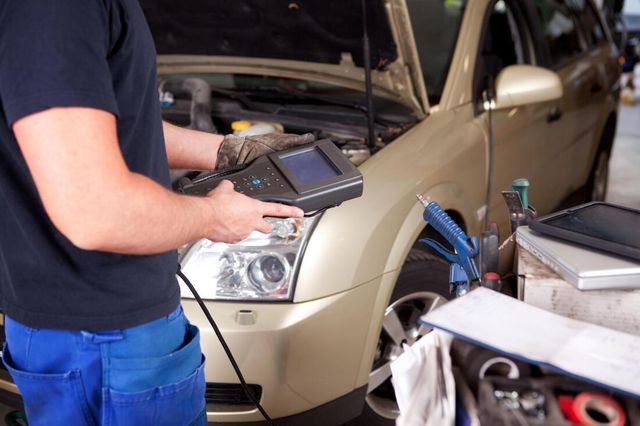The automotive industry and car repair services are intricately linked, each evolving in response to changes within the other. This interconnected evolution reflects broader trends in technology, consumer preferences, and industry practices. As vehicles become more advanced and repair processes more sophisticated, understanding this symbiotic relationship is crucial for both consumers and industry professionals.

The Evolution of the Automotive Industry
The automotive industry has undergone significant transformations over the years. From the early days of mass production to the latest advancements in electric and autonomous vehicles, the industry has continually pushed the boundaries of innovation.
- Technological Innovations: Modern vehicles are equipped with advanced features such as adaptive cruise control, lane-keeping assist, and sophisticated infotainment systems. These innovations enhance driving experiences but also introduce new complexities into vehicle maintenance and repair.
- Electric and Hybrid Vehicles: The rise of electric and hybrid vehicles represents a major shift in automotive technology. These vehicles offer benefits like reduced emissions and lower operating costs but also require specialized knowledge and equipment for maintenance and repair.
- Connectivity and Data: Vehicles today are more connected than ever, generating vast amounts of data through telematics systems. This connectivity provides opportunities for improved diagnostics and predictive maintenance but also raises questions about data security and privacy.
The Evolution of Car Repair Services
As vehicles have become more complex, so too have the services required to maintain and repair them. Car repair services have had to adapt to new technologies and standards, reflecting the ongoing evolution of the automotive industry.
- Increased Complexity: The integration of advanced technologies in vehicles has led to increased repair complexity. Repair technicians must now be proficient in electronics, software diagnostics, and high-voltage systems, necessitating ongoing training and investment in specialized tools.
- Specialized Repair Facilities: The rise of electric and hybrid vehicles has led to the establishment of specialized repair facilities. These shops focus on the unique needs of EVs and hybrids, such as battery maintenance and high-voltage system repairs.
- Data-Driven Diagnostics: The use of data analytics and diagnostic tools has revolutionized car repair services. Technicians can now access real-time vehicle data to identify issues more accurately and efficiently, leading to more effective repairs.
The Symbiotic Relationship
The relationship between the automotive industry and car repair services is a dynamic and reciprocal one. Each sector influences the other, driving continuous improvement and adaptation.
- Technological Integration: As automotive technology advances, car repair services must adapt to handle new systems and components. Conversely, the development of new repair tools and techniques drives further innovation in vehicle design and manufacturing.
- Consumer Expectations: Changing consumer expectations drive the evolution of both the automotive industry and repair services. As consumers demand more advanced features and better service, both sectors must evolve to meet these needs, leading to innovations in vehicle design and repair practices.
- Regulatory Changes: Regulatory changes, such as emissions standards and safety regulations, impact both vehicle manufacturing and repair practices. These regulations drive improvements in vehicle technology and repair procedures, ensuring that vehicles remain safe and environmentally friendly.
Opportunities and Challenges
The interconnected evolution of the automotive industry and car repair services presents both opportunities and challenges.
- Opportunities:
- Innovation in Repair Technologies: Advances in diagnostic tools and repair techniques provide opportunities for repair shops to offer more efficient and accurate services. Embracing these technologies can enhance service Mot And Service Reading quality and customer satisfaction.
- Training and Certification: As vehicles become more complex, there is a growing demand for specialized training and certification programs for repair technicians. Investing in these programs can help repair shops stay competitive and meet the evolving needs of the industry.
- Data-Driven Insights: The use of vehicle data for predictive maintenance and diagnostics offers opportunities for repair shops to provide proactive services, reducing downtime and improving overall vehicle performance.
- Challenges:
- Complexity of Repairs: The increasing complexity of modern vehicles poses a challenge for repair services. Technicians must continuously update their skills and knowledge to keep pace with technological advancements.
- Access to Information: Independent repair shops often face challenges in accessing proprietary diagnostic information and software updates from vehicle manufacturers. Advocacy for “right to repair” legislation can help address these issues.
- Data Security: The collection and use of vehicle data raise concerns about data security and privacy. Repair shops must implement robust measures to protect customer information and comply with data protection regulations.
Looking Ahead
The future of the automotive industry and car repair services will continue to be shaped by technological advancements and evolving consumer needs. The rise of autonomous vehicles, further advancements in electric vehicle technology, and the continued integration of connected systems will drive ongoing changes in both sectors.
For the automotive industry, this means continuing to innovate while addressing the challenges of complexity and regulation. For car repair services, it involves adapting to new technologies, investing in training, and leveraging data to provide high-quality, efficient services.
In conclusion, the interconnected evolution of the automotive industry and car repair services reflects a dynamic and reciprocal relationship. By embracing technological advancements, addressing challenges, and seizing opportunities, both sectors can continue to thrive and meet the ever-changing needs of consumers. As vehicles and repair services continue to evolve, their symbiotic relationship will remain a cornerstone of the automotive landscape.
